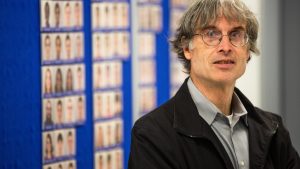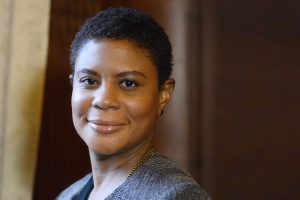“An American Dilemma for the 21st Century:” Event Will Assess Impact of the Influential work, An American Dilemma: The Negro Problem and Modern Democracy 75 Years Later
Top Scholars of Race and Racism in America Explore Legacy of Landmark Research Study at Schomburg Center Conference on Oct. 30
NEW YORK, NY — In the midst of today’s heightened racial conflict, a public, day-long conference will mark the 75th anniversary of the publication of An American Dilemma: The Negro Problem and Modern Democracy by Swedish Nobel laureate and economist Gunnar Myrdal. “An American Dilemma for the 21st Century” will revisit this landmark scholarly examination of multifaceted issues, including racial discrimination and economic inequality in America, reflecting on and advancing research on antiblack racism and its ramifications first highlighted in the 1944 work.
“An American Dilemma for the 21st Century” will take place on October 30, 10 a.m. – 7:30 p.m. at The Schomburg Center for Research in Black Culture, 515 Malcolm X Blvd., New York, NY (register and learn more).
The event brings together renowned scholars studying race in America (see full agenda), with a concluding keynote conversation featuring Jelani Cobb of Columbia University and Phillip Atiba Goff of John Jay College of Criminal Justice, moderated by Alondra Nelson, president of the Social Science Research Council.
The Social Science Research Council will launch a digital exhibition in conjunction with the conference, which will feature materials from the Myrdal archive at the Schomburg Center. “The Schomburg Center archives are a treasure trove for anyone who wants to learn about contemporary issues,” said Dan O’Flaherty, a professor of economics at Columbia University and a co-organizer of the conference. “For instance, in the archives you learn that in the 1930s, police killed roughly four times as many African Americans as lynch mobs, and that police accounted for more African American deaths than all other white people combined. And you learn where those deaths occurred.”

Brendan O’Flaherty, Professor of Economics, Columbia University
At 1,500 pages, An American Dilemma is a comprehensive documentation and analysis of the fundamental dilemma of the ideals of the American Creed and the realities of racial segregation, discrimination, and practices extant in the United States in the 1940s, and their resulting harmful effects on black Americans. The book was published during World War II, when the dilemma was vividly on display in what African American newspaper editor Elmer A. Carter called “…this strange and curious picture, this spectacle of America at war to preserve the ideal of government by free men, yet clinging to the social vestiges of a slave system”—in particular, a strictly segregated army. Myrdal placed observations like Carter’s in the mainstream of American thought.
The seminal book is often credited with laying the foundation for the civil rights and racial justice legislation which followed in the ensuing decades. It spurred President Truman to set up the first ever presidential commission on race relations, and to desegregate the federal workforce and the armed services. It was cited in the 1954 case Brown v. Board of Education of Topeka, Kansas, in which the US Supreme Court decided racial segregation in public schools was unconstitutional. Dr. Martin Luther King, Jr., used the book’s title in the charter of the Southern Christian Leadership Conference.
The Carnegie Corporation of New York, one of the sponsors of this conference, funded the original research, and chose Myrdal, a Swede, to lead the project, believing a non-American scholar would come to the project unbiased. The chief researcher and writer on the Myrdal team was Ralph Bunche, the African American scholar and diplomat who later became Under-Secretary-General of the United Nations (responsible for peacekeeping operations), and recipient of the 1950 Nobel Peace Prize. Myrdal was awarded the Nobel Memorial Prize for Economics in 1974.
Despite its scope, length, and detail, An American Dilemma has sold more than 100,000 copies and had 25 printings after its initial publication, uncommon for a scholarly work then or even now.
This 75th anniversary conference is sponsored by: the Social Science Research Council; The Schomburg Center for Research in Black Culture of the New York Public Library; Carnegie Corporation of New York; Program for Economic Research at Columbia University, The Department of Economics at Columbia University, the Institute for the Study of Economic Research and Policy, the Division of Social Science, and the Center of African American Politics and Society at Columbia University; the Institute for New Economic Thinking; and the Russell Sage Foundation.
About the Social Science Research Council
The Social Science Research Council (SSRC) is an independent, international nonprofit with the mission of mobilizing social science for the public good. Founded in 1923, the SSRC fosters research innovation, nurtures new generations of researchers, deepens inquiry within and across disciplines, and catalyzes public knowledge on important public issues. Based in Brooklyn, NY, the SSRC currently administers 22 programs in the United States and around the world. For more information on the SSRC and its programs, please visit www.ssrc.org.
About the Program for Economic Research (PER) at Columbia University
Founded in 2003, the Program for Economic Research (PER) at Columbia University funds research to address the economic challenges, trends, and policies affecting people around the world. Through the years, our mission of service remains that of supporting research activities at the highest possible level, disseminating new results, and to informing our global understanding of economic issues.
About the Schomburg Center for Research in Black Culture
The Schomburg Center for Research in Black Culture, a research unit of The New York Public Library, is generally recognized as one of the leading institutions of its kind in the world. For over 90 years, the Center has collected, preserved, and provided access to materials documenting black life, and promoted the study and interpretation of the history and culture of peoples of African descent. Educational and cultural programs at the Schomburg Center complement its research services and interpret its collections. Seminars, forums, workshops, staged readings, film screenings, performing arts programs, and special events are presented year-round. More information about Schomburg’s collections and programs can be found at www.schomburgcenter.org.
MEDIA CONTACTS:
Dewey Blanton
SSRC Communications
Phone: 718-517-3721
Email: blanton@ssrc.org
Sophia N. Johnson
Columbia | Economics
Phone: 212-854-1566
Email: sj2482@columbia.edu

